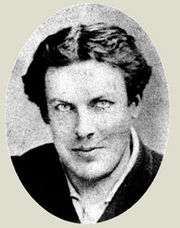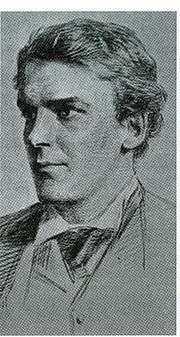James Kenneth Stephen


James Kenneth Stephen (25 February 1859 – 3 February 1892) was an English poet, and tutor to Prince Albert Victor, eldest son of Albert Edward, Prince of Wales.
Early life
Stephen was the second son of Sir James Fitzjames Stephen, barrister-at-law, and his wife Mary Richenda Cunningham. James Kenneth Stephen was known as 'Jem' among his family and close friends; he was first cousin to Virginia Woolf (née Stephen).
He was a King's Scholar at Eton, where he proved to be a highly competent player of the Eton Wall Game; and then went up to King's College, Cambridge, again as a King's Scholar.[1] In the Michaelmas term of 1880, he was President of the Cambridge Union Society. In 1883 he became tutor to Prince Albert Victor, Duke of Clarence and Avondale,[2] and was made a Fellow of King's College in 1885. He was a renowned intellectual; and it was said that he spoke in a pedantic, but highly articulate and entertaining manner.
Poetry
Stephen became a published poet, his work being identified by the initials J. K. S. His collections of poems Lapsus Calami and Quo Musa Tendis were both published in 1891. Rudyard Kipling called him "that genius" and told how he "dealt with Haggard and me in some stanzas which I would have given much to have written myself".[3] Those stanzas, in which Stephen deplores the state of contemporary writing,[4] appear in his poem 'To R. K.':
Will there never come a season
Which shall rid us from the curse
Of a prose which knows no reason
And an unmelodious verse:
When the world shall cease to wonder
At the genius of an Ass,
And a boy's eccentric blunder
Shall not bring success to pass:
When mankind shall be delivered
From the clash of magazines,
And the inkstand shall be shivered
Into countless smithereens:
When there stands a muzzled stripling,
Mute, beside a muzzled bore:
When the Rudyards cease from Kipling
And the Haggards Ride no more.
"The Last Ride Together (From Her Point of View)" parodies Robert Browning's "Last Ride Together"; Lord Byron is parodied in "A Grievance"; and William Wordsworth in "A Sonnet":
Two voices are there: one is of the deep;
It learns the storm-cloud's thunderous melody,
Now roars, now murmurs with the changing sea,
Now bird-like pipes, now closes soft in sleep:
And one is of an old half-witted sheep
Which bleats articulate monotony,
And indicates that two and one are three,
That grass is green, lakes damp, and mountains steep:
And, Wordsworth, both are thine
J. K Stephen was at Cambridge at the same time as the distinguished antiquarian and writer of ghost-stories, Montague R. James, and mentions him at the end of a curious Latin celebration of then-current worthies of 'Coll. Regale' (King's College):
Vivat J.K. Stephanus,
Humilis poeta!
Vivat Monty Jamesius,
Vivant A, B, C, D, E
Et totus Alphabeta!
Stephen wrote a satirical pastiche of Thomas Gray's "Ode to the Distant Prospect of Eton College" pillorying Eton for being Tory.
A poem which gave him a reputation as a misogynist is "Men and Women," where he describes two people, a man and a woman, whom he does not know but to whom he takes a violent dislike. The first part, subtitled "In the Backs" (The Backs is a riverside area of Cambridge), concludes
...I do not want to see that girl again:
I did not like her: and I should not mind
If she were done away with, killed, or ploughed.
She did not seem to serve a useful end:
And certainly she was not beautiful.
(Plough is slang for failing an exam.)
However many of his other poems show that this "misogyny" Is more accurately described as only one facet of a sardonic nature.[5]
Stephen was a member of the Cambridge "Apostles".
Death
Stephen suffered a serious head injury in an accident in the winter of 1886/1887 which may have exacerbated the bi-polar disorder from which he suffered. His cousin Virginia Woolf suffered from the same disorder throughout her adult life.[6] Stephen was eventually committed to St Andrew's Hospital, a mental asylum in Northampton.[7]
In January 1892 the former Royal tutor heard that his erstwhile pupil, the 28-year-old Prince Albert Victor, Duke of Clarence had died of pneumonia at Sandringham, after contracting influenza. On hearing the news, Stephen refused to eat, and died twenty days later, aged 32. His cause of death, according to the death certificate, was mania.[8]
Eton legacies
Stephen was noted for his prodigious size and physical strength. At Eton, he was an outstanding player of the Wall Game. He played for College on St Andrew's Day four times: in 1874, 1875, 1876 and 1877. In the last two years he was Keeper (or captain) of the College Wall. College beat the Oppidans by 4 shies to nil in his first year as Keeper, and by 10 shies to nil the next year. Ever after, the King's Scholars have honoured J K Stephen's memory with a toast at the Christmas Sock Supper or other festive occasions - in piam memoriam, J. K. S. (In pious memory of J. K. S.).
Stephen was recalled in less pious memory in a play by former Eton housemaster and Old Etonian, Angus Graham-Campbell; entitled Sympathy for the Devil, it premiered at the Eton Drama festival in 1993. This was based on the notion that Stephen could have been one of the Jack the Ripper suspects; this theory has been dismissed, because he would have been unable to return to Cambridge in time for lectures the following morning.[9]
Stephen's poem The Old School List from Quo Musa Tendis is included in the front pages of H. E. C. Stapleton's Eton School Lists 1853-1892, and the author refers to him in the preface as 'an Etonian of great promise, who died only too early for his numerous friends'. During his time at Eton, Stephen was a friend of Harry Goodhart (1858–1895), who became an England international footballer and later a Professor at the University of Edinburgh. Goodhart is referred to as "one of them's wed" in the last verse of The Old School List:[10]
There were two good fellows I used to know.
--How distant it all appears!
We played together in football weather,
And messed together for years:
Now one of them's wed, and the other's dead
So long that he's hardly missed
Save by us, who messed with him years ago:
But we're all in the old School List.[1]
- ^ "The Old School List". James Kenneth Stephen poems. www.poemhunter.com. Retrieved 7 February 2011.
Collections
- Select Poems 1926 Augustan Books of Modern Poetry
- Lapsus Calami JKS Cambridge 1891
- Quo Musa Tendis Cambridge 1891
- Lapsus Calami and other verses 1896
References
- ↑ "Stephen, James Kenneth (STFN878JK)". A Cambridge Alumni Database. University of Cambridge.
- ↑ Deborah McDonald, The Prince, His Tutor and the Ripper McFarland: 2007, biography of JK Stephen
- ↑ Kipling, R. Something of Myself, For My Friends Known and Unknown. 1937.
- ↑ Ellis P.B. H. Rider Haggard: a voice from the infinite. Routledge, 1978
- ↑ McDonald, The Prince, His Tutor and the Ripper
- ↑ McDonald, The Prince, His Tutor and the Ripper
- ↑ University of Toronto - Representative Poetry Online
- ↑ McDonald, The Prince, His Tutor and the Ripper
- ↑ McDonald, The Prince, His Tutor and the Ripper
- ↑ "James Kenneth Stephen". Jack the Ripper suspects. www.casebook.org. Retrieved 7 February 2011.
- Miles A H Stephen. In miles 9(10)
- JKS Acad 19 Aug 1905
- Benson A C, In his leaves of the tree: studies in biography, 1911
- Evans B I In his English poetry in the later 19th century 1933-1966
- Master of Light Verse - In memory of JKS; Times Literary Supplement 31 Jan 1941
External links
| Wikiquote has quotations related to: James Kenneth Stephen |
| Wikisource has original works written by or about: James Kenneth Stephen |
- Biography on "Jack the Ripper" suspects article
- Works by or about James Kenneth Stephen at Internet Archive
- Works by James Kenneth Stephen at LibriVox (public domain audiobooks)
